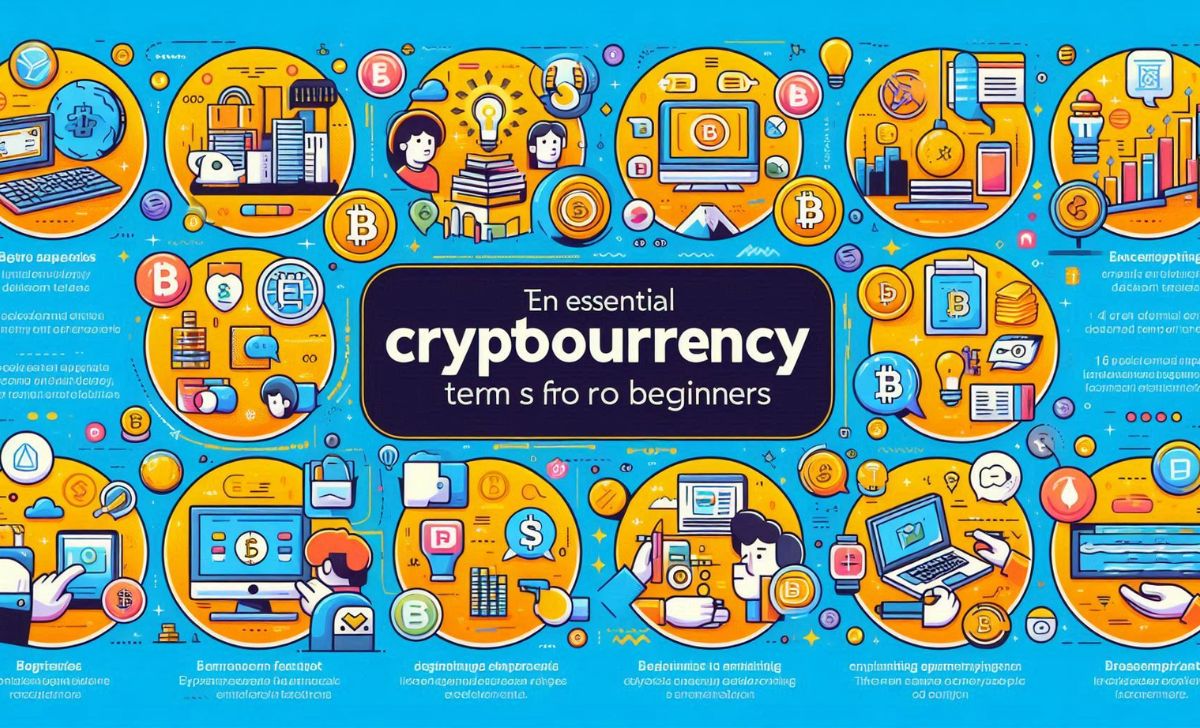Crypto terms, with their complexity and unique meanings, often leave newcomers to the cryptocurrency world feeling confused. Are you wondering what these terms actually mean? The article below from TopCoin9 will help you grasp the essential terms to better understand the world of crypto.
What Is Crypto? A Simple Introduction

Crypto (short for cryptocurrency) is a digital or virtual currency secured by cryptography. Unlike fiat money controlled by governments, crypto operates on decentralized networks—mainly blockchain technology. This core principle of decentralization ensures no single authority can control the network, making transactions more transparent and secure.
These digital assets have gained massive attention due to their high growth potential, especially in long-term crypto investing, where investors hold assets for several years hoping for substantial returns.
But to navigate this dynamic world effectively, it’s crucial to understand the terms that define it starting with why they matter in the first place.
Why You Should Learn Crypto Terms Before Investing

Before making your first trade, understanding crypto terms is vital. It helps you:
- Make informed decisions based on accurate information
- Understand market trends like short-term crypto spikes or long-term holding strategies
- Avoid scams and miscommunications when using exchanges or wallets
Let’s now explore the ten most essential crypto terms every beginner should have in their toolkit.
10 Crypto Terms Beginners Must Know

Here’s a beginner-friendly glossary that will boost your confidence as you enter the crypto world.
Cryptocurrency
A cryptocurrency is a digital asset used for online transactions. Examples include Bitcoin (BTC), Ethereum (ETH), and Tether (USDT). They’re the foundation of all other crypto activities. In every transaction cryptocurrency, these assets play a key role, whether for trading, staking, or peer-to-peer transfers.
Blockchain
A blockchain is a distributed ledger where all transactions are recorded transparently and immutably. It’s what makes cryptocurrencies decentralized and secure.
Wallet
A wallet stores your cryptocurrencies.
- Hot wallets are connected to the internet (e.g., MetaMask, Trust Wallet).
- Cold wallets store assets offline and are ideal for long-term crypto storage.
Public Key & Private Key
- The public key is your wallet address, used to receive funds.
- The private key is your password. Never share it. Losing it means losing your crypto.
Exchange
Crypto exchanges are platforms where you can buy, sell, or trade cryptocurrencies.
- Centralized exchanges (CEX) like Binance are user-friendly but controlled by companies.
- Decentralized exchanges (DEX) like Uniswap allow peer-to-peer trading without intermediaries.
HODL
A term from a misspelled word “hold,” meaning to keep crypto assets instead of selling. It’s the backbone of the long-term crypto strategy.
Altcoin
Any cryptocurrency other than Bitcoin. Examples include Ethereum, Cardano, and Solana. Altcoins are often more volatile but may have higher growth potential.
Token
Unlike coins (which operate on their own blockchains), tokens are built on existing chains like Ethereum (ERC-20 tokens). They represent various utilities, from in-game assets to governance rights. Some tokens are even categorized as stablecoin, designed to minimize price volatility by pegging to fiat currencies like the USD.
Gas Fee
A gas fee is the cost of performing a transaction on a blockchain. Ethereum’s gas fees can fluctuate, impacting both short-term crypto traders and long-term holders.
NFT (Non-Fungible Token)
A unique digital asset representing ownership of art, music, or virtual land. NFTs are powered by smart contracts and have grown alongside long-term crypto trends like Web3 and the Metaverse.
These core terms will give you the foundation you need but the crypto world is evolving fast, and there’s more terminology worth adding to your vocabulary.
Other Important Crypto Terms You Should Know
To deepen your understanding, here are more helpful terms:
- DeFi: Decentralized Finance—services like lending, borrowing, and trading without traditional banks
- Staking: Locking crypto to earn rewards
- FOMO/FUD: Emotional market reactions (Fear of Missing Out / Fear, Uncertainty, Doubt)
- DApp: Decentralized Application that runs on a blockchain
Now that you’ve grasped the essential and extended glossary, it’s time to apply your knowledge especially when choosing the right crypto strategy.
Which Crypto to Buy Today for Long-Term or Short-Term?

Choosing the right cryptocurrency depends largely on your investment goals. Are you in it for quick gains or steady growth over time? Understanding the distinction between long-term crypto and short-term crypto strategies can help you make smarter, more confident decisions.
Long-Term Perspective
If you’re wondering which crypto to buy today for long-term, focus on well-established projects with real-world use cases and strong development teams. Coins like Ethereum (ETH), Polkadot (DOT), and Chainlink (LINK) are common choices among long-term crypto investors following market stability and adoption trends.
Long-term crypto trends include decentralized finance (DeFi), Web3, and interoperability between blockchains—areas that these projects often lead.
Short-Term Opportunities
For short-term crypto investments, look for coins with momentum, recent news, or high trading volume. Meme coins or low-cap altcoins can offer quick gains but come with higher risk. Always research before making moves, especially if you’re asking which crypto to buy today for short-term gains.
By aligning your investment horizon with the right terminology and tools, you’ll be better positioned for success no matter how long you stay in the market.
With these strategic insights, you are now better equipped to navigate the crypto space. Finally, let’s take a look at some tips for beginners in the world of cryptocurrency.
Tips for Beginners in the Crypto World
New to crypto? Don’t worry these simple tips will help you start smart and avoid common mistakes.
Here are a few key tips to help you start your journey on solid ground:
- Start small and don’t invest more than you can afford to lose
- Always use secure wallets and enable 2FA on exchanges
- Follow trusted news sources and communities for updates
- Combine both short-term crypto moves with long-term crypto strategies to balance risk and reward
Understanding key crypto terms is the first step toward making informed and confident investment decisions. Whether you’re planning for short-term gains or exploring long-term trends, a solid grasp of the basics goes a long way. For more beginner-friendly insights and daily updates, visit TopCoin9 to stay ahead in the world of crypto.

As a certified blockchain security expert with over 8 years in cybersecurity, James Anderson specializes in auditing smart contracts and identifying vulnerabilities in DeFi protocols. His expertise ensures that TopCoin9 delivers reliable insights on blockchain security and risk management.
Email: [email protected]












